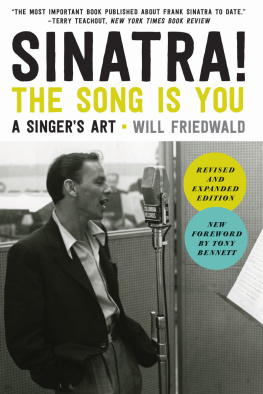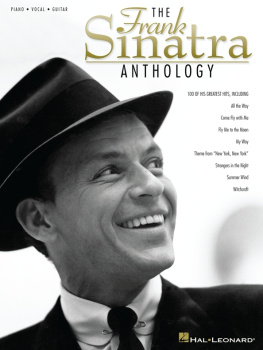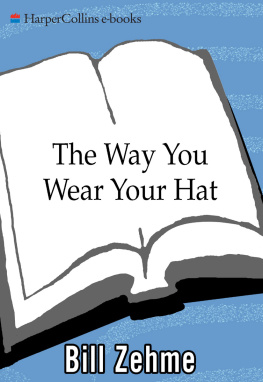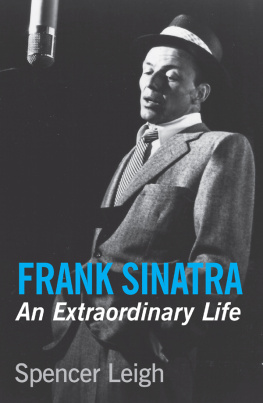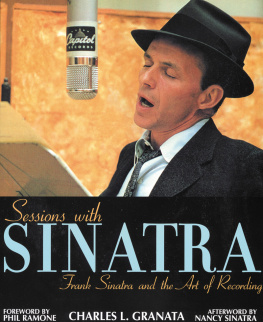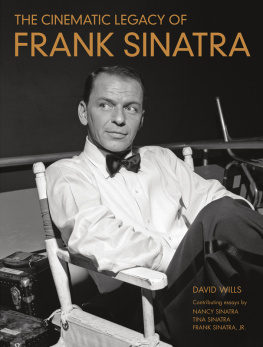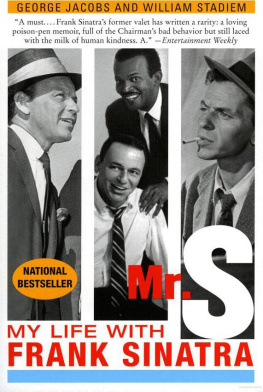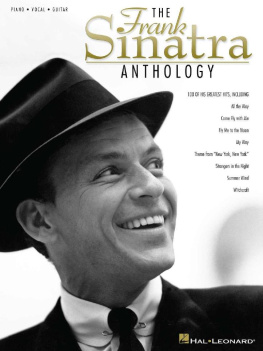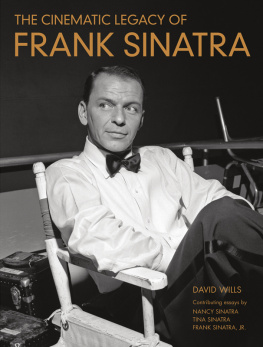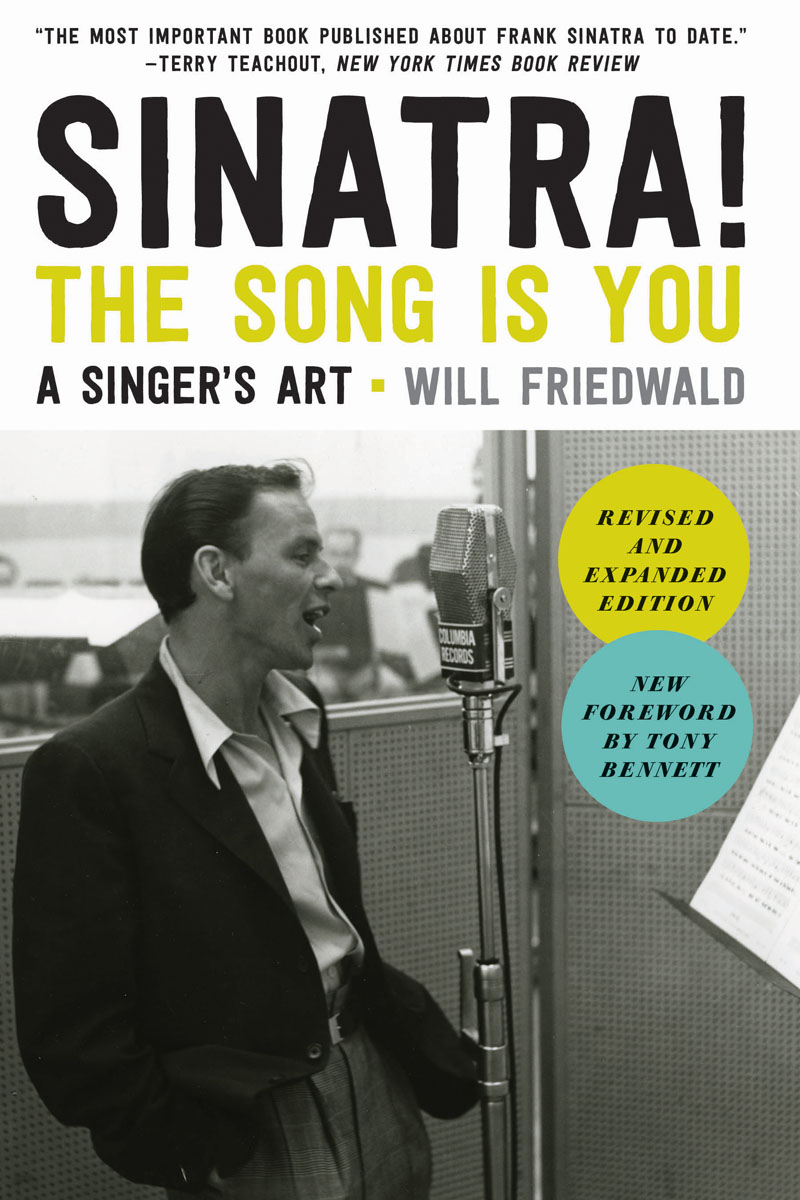
Copyright 1995, 2018 by Will Friedwald
Foreword copyright 2018 by Tony Bennett
All rights reserved
Published by Chicago Review Press Incorporated
814 North Franklin Street
Chicago, Illinois 60610
ISBN 978-1-61373-770-5
Library of Congress Cataloging-in-Publication Data
Names: Friedwald, Will, 1961- author.
Title: Sinatra! the song is you : a singers art / Will Friedwald.
Description: Chicago, Illinois : Chicago Review Press, [2018] | Series: Revised and expanded edition | Includes index.
Identifiers: LCCN 2017054445 (print) | LCCN 2017055331 (ebook) | ISBN 9781613737712 (adobe pdf) | ISBN 9781613737729 (kindle) | ISBN 9781613737736 (epub) | ISBN 9781613737705 (trade paper)
Subjects: LCSH: Sinatra, Frank, 1915-1998. | SingersUnited StatesBiography.
Classification: LCC ML420.S565 (ebook) | LCC ML420.S565 F78 2018 (print) | DDC 782.42164092 [B]dc23
LC record available at https://lccn.loc.gov/2017054445
Cover design: Debbie Berne Design
Cover photographs: Charles L. Granata
Interior design: Jonathan Hahn
Printed in the United States of America
5 4 3 2 1
DEDICATION
For Patty, my one and only love.
She loved me for the dangers I had passed,
And I loved her that she did pity them.
This is the only witchcraft I have used.
Othello: Act 1, Scene 3
Those fingers in my hair,
That sly, come-hither stare,
That strips my conscience bare.
Cy Coleman & Carolyn Leigh
CONTENTS
FOREWORD
When people hear the name Tony Bennett, they inevitably think of two things. The first is my signature song, I Left My Heart in San Francisco, which first made me an internationally known citizen of the world fifty years ago, and Ive been happily singing it ever since. And the other thing that nearly everybody knows about me is that Frank Sinatra once named me as his favorite singer.
Obviously, I can never communicate completely how much that meant to menot only to my career, but to me personally. You see, I was one of the original Sinatra groupies. Back when I was in New Yorks High School of Industrial Art, I used to get out of classes to see the Tommy Dorsey Orchestra at the Paramount. I would stay for seven shows a day at the Paramount, and just watch him over and over again. Just imagine, in those days you had Tommy Dorseys band, with Jo Stafford, the Pied Pipers, Buddy Rich, and Ziggy Elman, plus a dance team, a great juggler, or a comic. All that plus Frank Sinatra! All these acts in an hour and twenty-five minutes, for seventy-five cents. I didnt even mind having to sit through the movie seven times.
The whole Sinatra saga really just took off from there. Even in the Dorsey days, there was the most incredible furor over Frank. The bands press agent, for instance, would spread the word around that Sinatra was going to be in the Gaiety Music Shop on Broadway at such and such a time, and he would also arrange for news photographers to be there. The place could only hold about seventy-five people, but thousands of bobby-soxers would cram themselves into that little store! Broadway would look like it did on New Years Eve. No one had ever seen anything like that before, and it was certain to get Frank and the band a two-page spread in the New York papers.
After the war, when I became a singer myself, I was signed to Columbia Records, which, coincidentally, was the same label Frank was under contract to. Although we were both at Columbia for about two years, we never actually met at this time. It wasnt the happiest period in Franks life, partially because he wasnt happy with the kind of songs Mitch Miller, who was then in charge of pop music A&R at Columbia, wanted him to record. Of course, I had my own issues with Mitch, although he and I created a lot of hits together.
How I finally met Francis Albert Sinatra is one of the great little stories of my life. By 1956, I had had a few hits, like Rags to Riches and Because of You. At this time Perry Como was the biggest thing on television. Perry was nice enough to offer me the chance to take over for him as a summer replacement. However, the various agencies involved sort of left me hanging: where Perry had Mitchell Ayers and his huge thirty-fivepiece orchestra, the Ray Charles Singers, and a fabulous roster of guest stars, they wouldnt give me anythingjust an empty stage and a cut-down ten-piece band. And no big-name guest stars, which meant I could never get any ratings. Now Im usually nervous when I hit the stage to begin with, but this time I was at a total loss.
I was so desperate that for some reason I thought of going to see Frank Sinatra for adviceeven though we had never met! I was so impressed by Sinatra and such a fan of his that somehow I felt that he could help me. Fatefully enough, he was back at the Paramount, only by now he was being backed up by Tommy Dorseys orchestra and sharing the bill with one of his own movies. When I told people Im going to go backstage and see Sinatra! everybody said, You gotta stay away from him, hes tough! Look out! But I just said, No, no, Im gonna go take a shot at this. So, I just knocked on his dressing room door, and he opened it and said, Come in, kid. I was surprised that he even knew me!
And we sat down and he gave me the best music lesson that I could ever imagine. I told him how nervous I was. He said not to worry about that, the people dont mind when youre nervous. Its when youre not nervous that its dangerous. If you dont care, why should the people care? The fact that youre nervous is to your credit, Frank told me. People will adore that, theyll see that you really want to go over and theyll support you for that. Frank not only gave me the confidence to make the television show as good as I possibly could, he gave me a great lesson that I follow to this day. Being excited is a very essential part of performing: those butterflies mean that you care about what youre doing. Is the light gonna work? Am I gonna remember the words? You have to be concentrated on these elements when you do a show.
Through the years Sinatra said wonderful things about me, and really helped build up my audience for me. One of the first compliments Frank paid me has always stayed with mehe told me, Tony, you can only be yourself, but youre very good at that.
I feel Sinatra is the best example of the best music that ever came out of the United States. Not only is he a great interpreter, he has a magic voice. Before Frank, Bing Crosby had really invented the concept of singing intimately, and the microphone made that possible. It was a total break from the earlier, more operatic style, where singers like Al Jolson had to hit the back of the house. But Sinatra took it a whole step further in a way that no one could have imagined. What Sinatra did was psychologically communicate precisely what he was thinking at any moment. After Sinatra, there was no longer any wall between performer and audiencehe invited listeners under his skin and inside his brain. He perfected the art of intimacy, and that was a big contribution to the art of popular music. No one ever did that before, to tell such vivid and completely believable stories using the popular song.
But what made an impression on me was that Frank was the one who taught me just not to compromise. He said just to do good songs and success will follow. Thats the most important thing he taught me. I asked him many years later, Why do you think you and I have stayed around so long? He said, Theres no mystery, its because we stayed with good songs. And hes right: we never compromised, we just stayed with the best music that we knew, and people responded to that.
Next page
